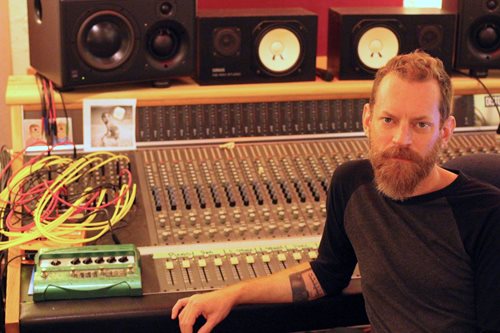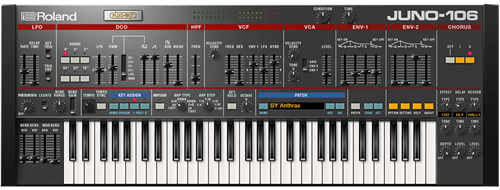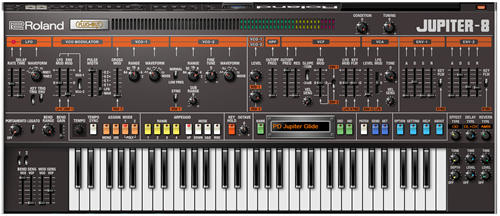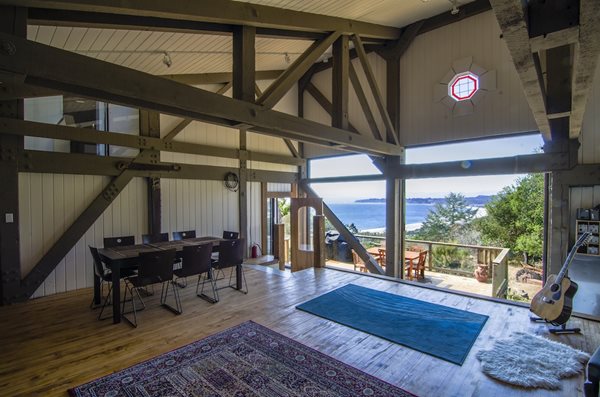
Artist Spotlight: Robert Cheek
On making a song work, synths, and how technology influences his process
The man behind the curtain. The fifth Beatle. The silent partner. Helming the ship, a good engineer can define the sound of a recording and plays an integral role in shaping the vision of the artist. Despite this, the recording engineer can sometimes be a misunderstood component of the music-making process. The landscape of engineering has changed wildly over the last few decades. The advent of home recording technology—with DAWs at the forefront—has forced the industry to reassess the roles of artist, producer, and engineer.
Robert Cheek has been a professional engineer for almost 20 years. Originally from California, the Seattle-based Cheek has recorded artists like Deftones, Tycho, Band of Horses, and Chelsea Wolfe. In homage to Roland Cloud’s SRX STUDIO release, we caught up with Cheek to discuss making a song work, synthesizers, and how technology influences his process.

Tell us a little about yourself.
When I was 19, I had a full-time job and decided it would be a good idea to get a credit card and purchase a bunch of recording equipment. Looking back, I made terrible decisions in my gear selections, but it didn’t matter. I was so excited to get started recording bands that anything would do.
An engineer friend of mine, Shaun Lopez, was starting to record bands at The Hangar in Sacramento. Shaun offered to help me learn the patch bay, promising that the drum sounds would be far superior to the ones I was getting in the kitchen of my apartment. As a result, I started doing sessions there occasionally.
The owner of The Hangar, John Baccagaluppi, is also part owner of the recording magazine Tape Op. He was and is a recording encyclopedia. John took me under his wing and showed me the ropes. I’ve never looked back.
Is there a predetermined path or ethos you adhere to when recording and producing?
Absolutely not. I used to be dogmatic about one particular idea though: If a song is good on its own—with just piano or guitar and voice—and you have good melodies, chord changes, and lyrics, you can’t go wrong. I still think it’s a good platitude, but I’m also learning that a simple drone with four words can be completely magical.
I work mostly with bands. In that setting, you’re dealing with many personalities so having a preconceived way of working seems futile. Encouragement works great for some people. Talking shit might work great on the next guy. It sounds cliché but I do try to approach each project a little differently and I also try to find what is going to work best for the artist I happen to be working beside.
If a song is good on its own—with just piano or guitar and voice—and you have good melodies, chord changes, and lyrics, you can’t go wrong.
What are some of your favorite records you’ve done and why?
Tangler by the band Worker Bee is probably the album I’m most proud of from an engineering perspective. The band was very adamant about working with the restrictions of tape and also wanted to record at home. We rented an MCI 1’’ 8-track and put together a decent collection of mics and outboard gear.
The band was well rehearsed and already made plans about how to get away with our limited eight tracks. I printed the drums to just two tracks and really had to commit to the sounds I was getting in the moment. It was pretty old school. The record is a magical stamp on a period of time in my career and the music has an incredibly unique character as a result.
Why Are You OK by Band of Horses is another one that sticks out. It was a long recording process over many sessions. Each session produced so many fun memories and when I listen to the music, I can still remember almost every drum track or vocal take. “On this song we were doing drums in NY and it was snowing,” or “When Ben was singing this song, we were sipping tequila and talking old Seattle stories.” You get the idea.
It was also one of my first experiences working with a band that I was already a fan of and that made it extra special. I left the session enjoying their music even more than I previously had.
Coming from your traditional recording background, tell us about your experience integrating digital into your workflow.
I learned to engineer on tape and a lot of the editing and recording features still feel the closest in Pro Tools. However, I’ve been looking at other DAWs lately as my interest in electronic music has grown substantially over the years. It seems like there are quite a few options out there, and some might be better for loop or MIDI-based forms of music.
On the subject of electronic music, do you believe there is competition between virtual and analog synthesis, or do they occupy different space from an engineering perspective?
This is certainly a weighted question amongst my contemporaries, and I think there is value in different perspectives. Many of the new virtual instruments sound amazing and can definitely hold their own against the vintage analog piece of gear they are modeling. Some of them do a better job and have more parameters than the hardware pieces.
It’s invaluably convenient from a composition standpoint to be able to quickly toggle between instruments and see what fits the song best. I also love not having to worry about tuning or ground hum. On the other side of the argument, I am a fairly tactile engineer and I love having my hands on the knobs. I know I’m not alone in this sense as it often leads to a lot of happy accidents. There’s also something to be said for that magic vintage Rhodes or JUNO at the studio that just has a nice familiar sound.
It’s invaluably convenient from a composition standpoint to be able to quickly toggle between instruments and see what fits the song best.
Speakling of classic keyboards, what are your favorite Roland Cloud instruments and why?
All of them are super rad, but I love the JUNO-106 and the JUPITER-8. It’s so convenient having access to these awesome instruments at such an inexpensive price point.


What are your thoughts about mixing in a DAW, on a board, and everything between?
Mixing in the box vs. analog is a real can of worms. Every engineer/mixer seems to have a very different opinion at this point. One of my favorite mix engineers is Ken Andrews from the band Failure. I've seen him in multiple interviews saying that he strictly mixes in the box and loves the results. When I listen to his records, I agree.
I've done shootouts of mixes on a console and in the box and still feel like I prefer analog summing of some sort, be it a mixing console, passive mixer, etc. Plugins have come a long way, but I still rely heavily on my outboard gear as hardware inserts during mixing. At my studio I have a late '80s Neotek console.
For tracking, I think the front-end signal path is pretty important. I still think the actual hardware into a great converter is the winner for me for now. One track at a time, the plugin is, perhaps, only 5-10% noticeable. However, when you add up all the instruments, that's when I'm glad I used real hardware going in.
Every recording studio is unique in its characteristics and vibe. Do you have a favorite studio to work out of?
My favorite studio to work out of is Panoramic Studios in West Marin, CA. It is a crazy old house built by a math teacher in the ‘60s. It was purchased from his children about six years ago and remodeled into a studio. It overlooks the ocean up on a hillside and has a priceless vibe for creativity, relaxation, and solitude.

The gear list is on par with what you would find in any fancy LA or NY studio, but it has a much more affordable price tag. The huge kitchen and deck area where you will find everyone between takes. It’s a special place. Also, the owner is synth nerd and gear hoarder so there’s no shortage of toys for any idea that might pop up.
What are some of your go-to pieces of equipment and plugins?
My favorite go-to piece of equipment is my Highland Dynamics BG2. It’s a compressor by an LA-based company that sounds amazing on everything. It has a number of cool compression options and can also be used as a tasteful harmonic distortion box. I also have a vintage Neumann U67 that I often travel with because it’s my favorite vocal mic and an all-around workhorse. I keep a re-amp on the mixing board for running tracks through pedals during mixing.
In the box, I’m currently obsessed with the Fab Filters ProQ3. It’s one of the most musical digital EQs I’ve heard and is great for carving out garbage in the tracks. I also rely heavily on the Soundtoys stuff. I find their plugins to be a must-have in my day to day work.
Have plugins colored your workflow?
If I’m being totally honest, I would say that plugins have made me a slightly lazier engineer but have also allowed me to focus more on the production side of things. For instance, I used to be pretty crazy about getting “perfect” guitar sounds, and to a large extent, I still am.
Now, if the EQ isn’t coming over the mic exactly like I want it—rather than spend another 20 minutes solving it by moving the mic around or chasing down the problem—I’ll think to myself, “That sounds pretty damn good, not quite A+, but I can EQ it in the mix later. So, let’s move forward and work on the song!” I still try to adhere to a let’s-get-it-right-on-tape mentality but I do feel a little freer knowing the power of the plugins I have at my disposal down the road. Please, don’t let any of the guys that mix my records read this!
There’s nothing quite as satisfying as working with an open-minded artist and totally reinventing their song in a way they may not have heard before.
As an engineer, how often do you end up producing as well?
I would say that I ‘produce’ about 60-70% of the records I engineer. I enjoy both roles in different ways. It’s pretty rad working for a cool producer you respect and just worrying about the technical side of things. I love watching someone else shape the songs and I try to learn from their approach.
When I do produce, I enjoy digging in with the band and going to the rehearsals. There’s nothing quite as satisfying as working with an open-minded artist and totally reinventing their song in a way they may not have heard before.
You can learm more about Robert Cheek at his official site. Below is a playlist with selected examples from his extensive discography.
Photos Courtesy of the Artist